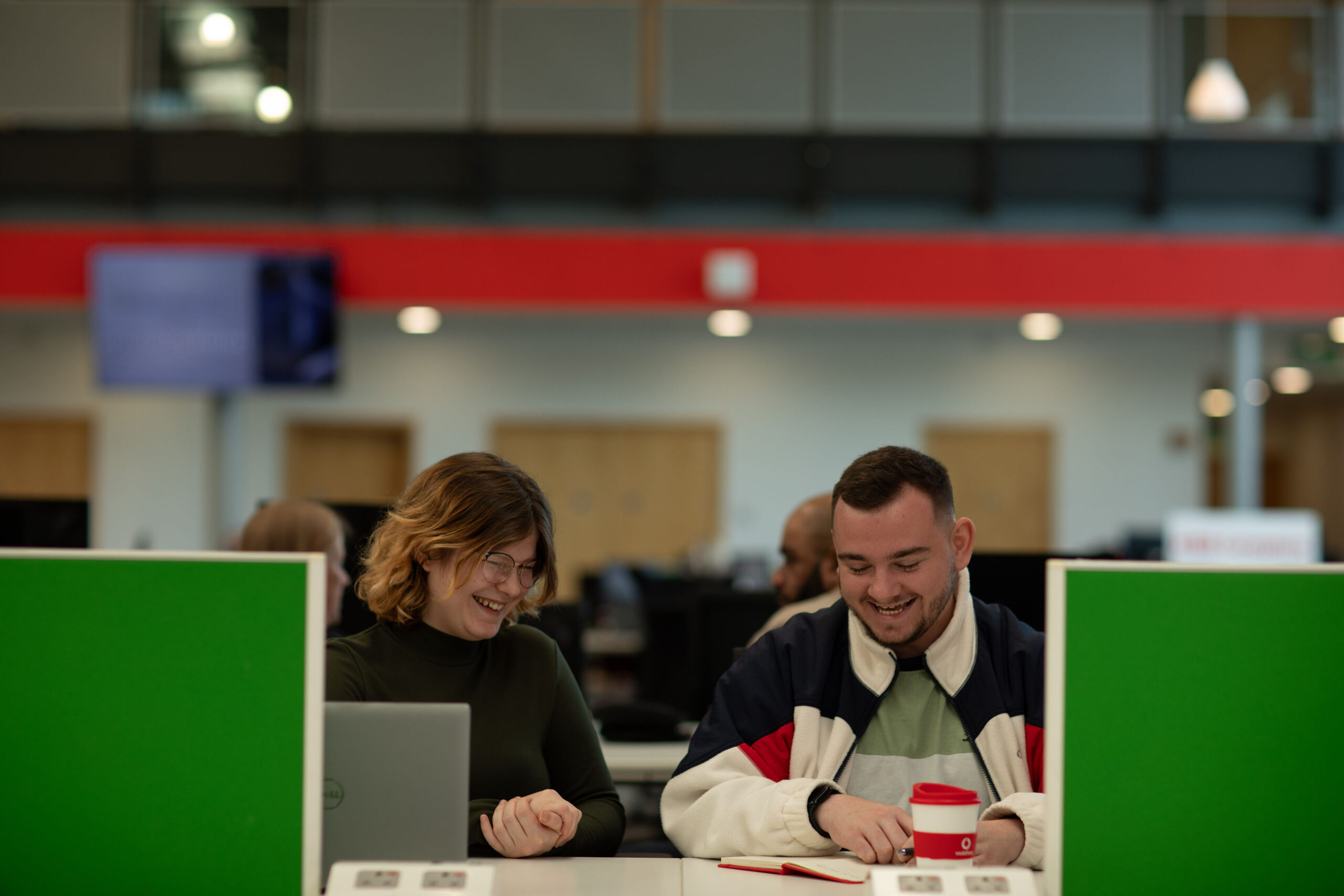Applying to work with us
How does it work? What’s the process? How can you make sure your application stands the best chance of success? Is our recruitment process fully accessible?
Here, we’ll tell you everything you need to know about applying to work with Vodafone. We want you to support you to be at your very best throughout the process to have put this page together so you know what to expect. If you require any adjustments throughout the application please see more detail within this page.
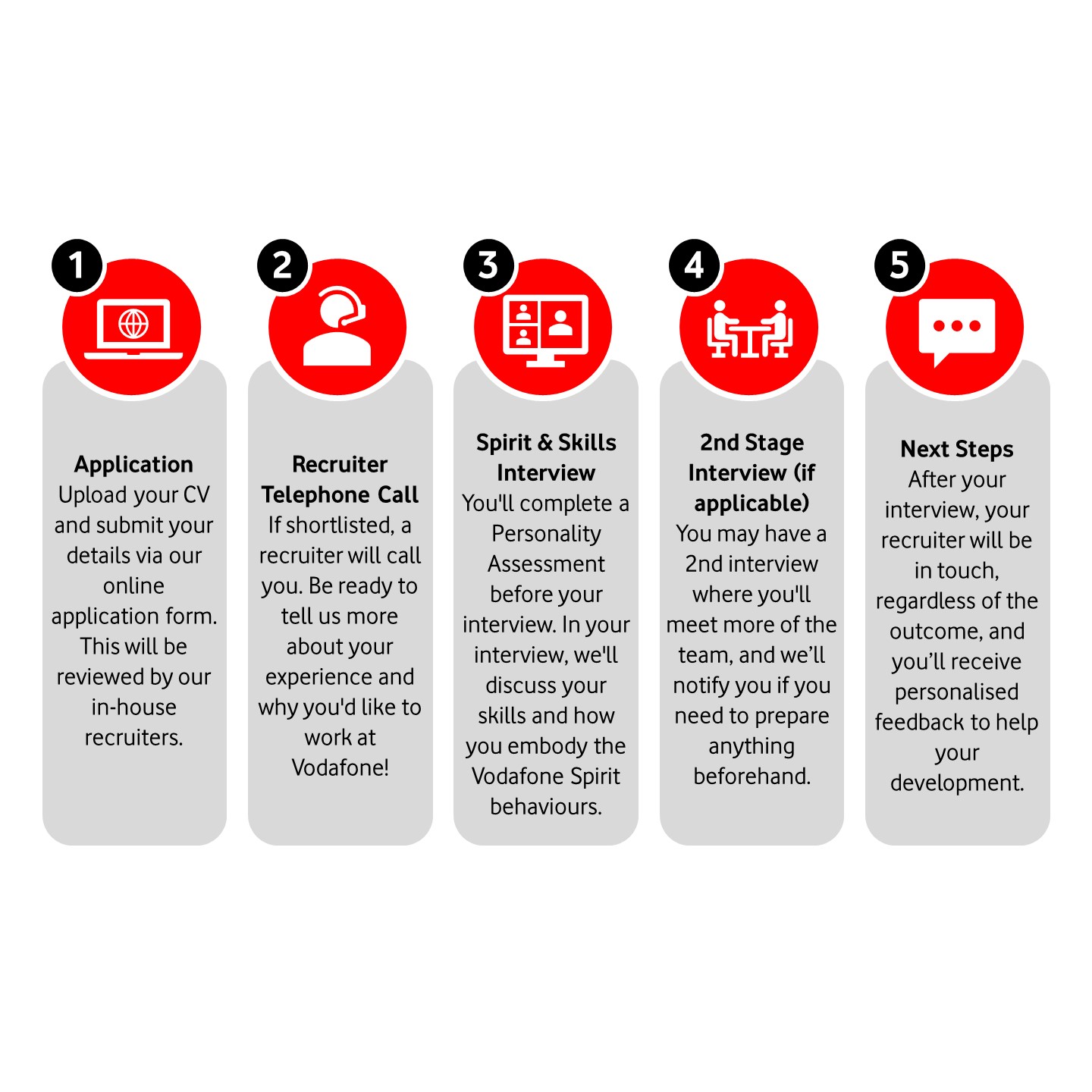
Our Application Process
When applying for a role at Vodafone, we want you to have the best opportunity to succeed, so we’ve kept our application process simple and accessible to all.
We’re here to support you throughout the process and aim for transparency, which is why we are proud to display our initial ‘Spirit Behaviour’ interview questions on our website (under Spirit and Skills Interview) to help you prepare for your first stage interview.
If you require any adjustments, please see more details below on how you can let us know!
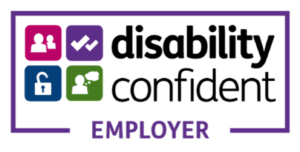
Spirit and Skills Interview
After completing the Personality Assessment Questionnaire stage, you will be invited for your first interview with us. Here we will focus on the assessment of the Spirit behaviours by using competency-based questions to understand your alignment to our Spirit Values. You can read more about our Spirit of Vodafone; who we are and how we work here.
During the Vodafone Spirit and Skills interview you may also be asked role specific questions to explore skills required to perform successfully in the role. To help you prepare, we've listed some types of questions you could be asked for each Spirit Value below. You don’t need to worry about planning responses to all – we advise using the questions as a starting point to reflect on your experiences and think of a few examples that demonstrate each Spirit Value showcasing your experiences, skills and potential.
If you're unsure of your banding, please ask your recruiter to confirm.
EARN CUSTOMER LOYALTY
- Tell me about a time you have made a change in an organisation to improve the customer experience.
- To be successful we need to put our customers at the heart of our decision making. Tell me about a time you’ve acted on a piece of feedback from a customer.
- Give me an example of when you have developed a customer first mindset in your team or business area.
- Describe a time you were unable to deliver a product or service on time or to the standard expected for a customer/client.
- Describe a time you’ve used insight from your customers to drive decision making in your area.
CREATE THE FUTURE
- Tell me about a time when you have created a safe space for others to share ideas.
- When have you bought in an innovative idea to your organisation as a result of external research?
- Give me an example of when you have encouraged others to challenge the status quo. What was the outcome?
- Tell me about a time you have implemented a new idea that was considered a risk.
- What techniques do you use to generate innovative solutions to business challenges? Give me an example.
EXPERMIENT AND LEARN FAST
- Give me an example of when you have encouraged others to see change as a learning opportunity.
- Tell me about a time you have changed your approach to work based on feedback.
- The look and feel of the workplace has changed significantly in the past years, with a move to fully virtual and hybrid working practices. Give me an example of something you had to change about your leadership style in that time?
- In today’s climate we need to use data and insight to stay ahead of the competition. Give me an example of when you have done this?
- Tell me about a time you’ve led a significant change that hasn’t gone to plan. What did you learn?
GET IT DONE TOGETHER
- How do you make sure you recognise excellence whilst managing underperformance? Give an example of when you’ve done this.
- Developing a culture of openness and trust is essential to being a great leader. Give me an example of when someone has challenged your viewpoint effectively
- You’ll often need to adapt your approach to ensure buy-in and commitment from a diverse range of people. When have you had to adapt your style to gain commitment from others?
- Tell me about a disagreement you’ve had that has impacted the delivery of a work outcome. How did you handle the situation?
- Tell me about how you set clear and ambitious targets for your team whilst giving them the freedom to decide how to deliver them. Give me an example.
EARN CUSTOMER LOYALTY
- Can you tell me about a time you have improved customer experience by providing feedback to an individual or a team?
- To be successful we need to put our customer at the heart of our decision making. Tell me about a time you have acted on a piece of feedback from a customer?
- How do you ensure that customer loyalty drives your decision-making, can you give me an example of when this has led to success?
- Tell me about a time you have made a change in your area or team to improve customer experience.
- Give me an example of something you have done to preserve or strengthen a customer/stakeholder relationship.
CREATE THE FUTURE
- Give me an example of when you have balanced your immediate day to day priorities with creating a vision for the future?
- Tell me about a time when you have created a safe space for others to share ideas?
- Tell me about a time you created a new process or product that was considered risky?
- Tell me about a time you have had to generate a lot of new ideas quickly, either individually or as part of a team?
- Tell me about a time you have had to influence someone to capitalise on an opportunity you identified?
EXPERIMENT AND LEARN FAST
- Can you give me an example of when you have encouraged experimentation in the workplace?
- Tell me about a time you have changed your approach to work based on feedback?
- Can you tell me about a time where you have led a team, and something did not go to plan? How did you respond?
- Give me an example of when you have used external insights to implement a change at work.
- We all make mistakes at work. Tell me about a mistake you have made which has helped you to grow?
GET IT DONE TOGETHER
- Describe how you would approach ensuring you build working relationships with a wide range of people. Give me a specific example.
- Tell me about how you set clear and ambitious targets for your team whilst giving them the freedom to decide how to deliver them. Give me an example.
- Tell me about a time when you have found a team or individual challenging to work with. How did you resolve the situation?
- Tell me about a time you have had to form a cross department and/or diverse team to work together. How did you approach this and what was the outcome?
- In today’s environment it’s important to be able to lead and motivate your team in a hybrid virtual & face to face environment. How have you approached this in your current role?
EARN CUSTOMER LOYALTY
- Tell me about a time you've exceeded a customer or stakeholder's expectations.
- Tell me about a time when you have dealt with a particularly challenging customer or stakeholder.
- Tell me about a time you did your best to solve a customer or stakeholder issue and the individual was not satisfied.
- Tell me about a time when you have worked with your team to improve customer loyalty.
- Describe a time you have acted on a piece of feedback you've received from a customer.
CREATE THE FUTURE
- Give me an example of a problem you have solved in a unique way.
- We often use established solutions to solve business challenges. Tell me about a time using an established approach did not work for you.
- Tell me about a time you have had to generate a lot of new ideas quickly, either individually or as part of team.
- Give me an example of an opportunity that you identified and were able to take advantage of.
- Tell me about a time when you created a safe space for others to share their ideas.
EXPERIMENT AND LEARN FAST
- Tell me about a time you have changed your approach to work based on feedback.
- The look and feel of the workplace has changed significantly in the past years with a move to fully virtual and hybrid working practices. Give me an example of something you have had to change about your approach to work in this time?
- Give me an example of when you have helped someone else develop or learn something new.
- Give me an example of when you've had to learn something quickly for an interview or a task.
- We all make mistakes at work. Tell me about a mistake you've made that's helped you to grow.
GET IT DONE TOGETHER
- Give me a recent example of when you have developed your internal or external network.
- Can you think of an example of a time that you enabled or supported a colleague to move their idea forward?
- Tell me about a time where you have found a team or individual challenging to work with. How did you resolve the situation.
- When leading a team, how do you foster an environment that encourages collaborative work ad thinking? Give me an example.
- Give me an example of a time when you removed a barrier that was getting in the way of getting the job done.
Interview Support
In most instances, there are at least two interview stages; a telephone interview and either a face-to-face interview or a virtual interview. Some roles may hold additional interview stages or conduct role-related activities or tests to further assess your ability for the role. These could include presentations, technical testing or sales-based scenarios.
Preparation is key. Naturally, interviews can be a very nerve-wracking experience but, as with anything, preparation (and practice) makes perfect. Set yourself up for success by adequately preparing ahead of the interview.
Prior to your first stage interview with Vodafone you will be invited to complete a short Personality Assessment Questionnaire. There are no right or wrong answers; the questionnaire is used to evaluate your decision-making in work-related scenarios in line with the Vodafone Spirit Behaviours. Please ensure you complete the assessment within 5 days of receiving the invite as we do require the assessment prior to your first-stage interview.
If you require a adjustments to support you in completing the assessment(s) please contact your recruiter or add this to your candidate profile under the 'Reasonable Adjustment' section.
Whether you are interviewing on the phone or on a video call, remember these tips.
Consider your surroundings: make sure you’re somewhere quiet where you won’t be disturbed. For video calls, make sure your background is professional and won’t distract your interviewer in virtual interviews. And don’t forget to make sure you’re somewhere with a good Wi-Fi connection.
It may sound silly, but you can hear a smile. Smiling whilst talking to someone on the phone changes your tone of voice and helps to convey your enthusiasm and interest. Your body language can also help too – slumping on the sofa will come across in your tone and it could sound like you are uninterested in the interview.
Nerves can strike all of us unexpectedly. Don’t let them get the better of you – make sure you listen carefully to the question and try to focus on the key words to make sure you know what kind of answer your interviewer is looking for. If you’re not sure, ask for the question to be repeated. Don’t forget to breathe and take a moment to pause and think about your response. Those few seconds can really help to gather your thoughts and provide a great answer.
Telephone or video interviews are great occasions to ask some questions and take some notes. This is an opportunity to get some great research directly from an existing employee. The answers you receive could shape conversations you have with the hiring managers and help you stand out against other candidates.
You can have the best example from a previous experience in the world, but if you don’t communicate it properly, the impact could be lost. Structure your answer – we often recommend following the STAR technique: Situation, Task, Action and Result to help you provide as much information to the interviewer as possible.
Always answer truthfully – ensure that all the information you are providing to an interviewer is accurate. It’s tempting to want to sound like the perfect candidate, but remember we often look for potential, including those who acknowledge their areas of development and are willing to learn and grow.
Tell us about your adjustments
At Vodafone, we really recognise and value the potential, talent, and contribution that people with disabilities add to our organisation. We are on a journey to design an inclusive application process for people with disabilities and we are learning every day. We want you to have the best experience possible with us and that starts right at the very beginning.
Learn more about how we support colleagues with disabilities.
If you have an accessibility request or require any adjustments for example, extended time or breaks in between online assessments, a sign language interpreter, or assistive technology, please let us know by either emailing ukrecruitmentsupport@vodafone.com or calling 07342 088598.
We’ll need the following details:
- Your full name
- Your preferred method of contact (email or telephone) and your contact details
- Is your query relating to a specific role you’ve applied for? If so, please provide the role title and reference number (the reference number can be found in brackets next to the role title.)
- Information on the accessibility required or any additional support needed
For information about how Vodafone processes your personal data, please see our Vodafone UK Candidate Privacy Statement.

Search for roles and apply
Ready to take the next step? Take a look at all our current available roles across the UK.
Explore our opportunities Albania
Albania  Czech Republic
Czech Republic  Deutschland
Deutschland  Greece
Greece  Hungary
Hungary  Ireland
Ireland  Italy
Italy  Luxembourg
Luxembourg  Netherlands
Netherlands  Portugal
Portugal  Romania
Romania  Spain
Spain  United Kingdom
United Kingdom  Asia-Pac Middle East
Asia-Pac Middle East  Turkey
Turkey  DR Congo
DR Congo  Egypt
Egypt  Ghana
Ghana 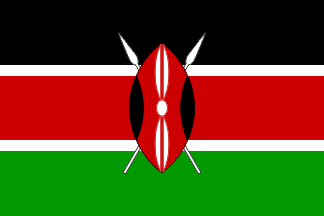 Kenya
Kenya  Lesotho
Lesotho  Mozambique
Mozambique  Nigeria
Nigeria  South Africa
South Africa 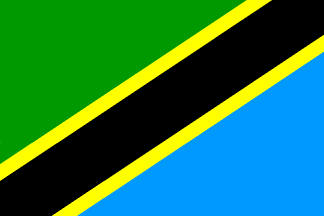 Tanzania
Tanzania 